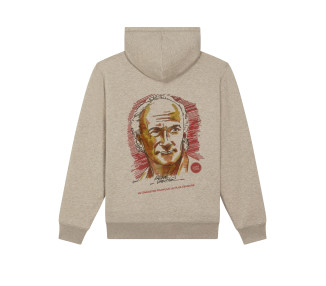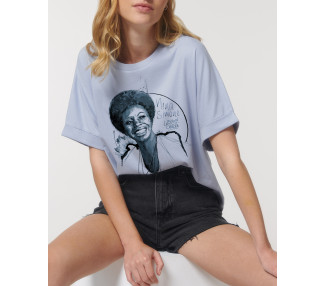René Vautier : un cinéaste de combat inscrit au Panthéon United Souls
On this January 15th, we pay tribute to René Vautier, a visionary filmmaker whose commitment to justice has left an indelible mark on the history of militant cinema. Today, he stands among the iconic figures of the United Souls collection, alongside those whose battles against injustice transcend generations.
A Committed Filmmaker from a Young Age
Several years ago, alongside my partner Guillaume Marty from the Kalakuta Productions association, I had the chance to discover René’s work at the Terra Nova bookstore in Toulouse. This engaged space, which I warmly encourage you to visit, offers United Souls tote bags. Why not seize the opportunity to leave with a tote bag featuring your favorite figure of resistance, filled with inspiring books? It’s a great way to awaken your consciousness while supporting this bookstore, which embodies values of solidarity and resistance.
The Courage of René Vautier: From Resistance Fighter to Cinematic Activist
Astonished by his bravery, I learned that René joined the Resistance at just 15 years old, earning several honors for his dedication. After graduating from the Institut des Hautes Études Cinématographiques (IDHEC) in 1948, he traveled to Côte d’Ivoire, my homeland, where he directed Afrique 50, a documentary denouncing the crimes of French colonialism.
This first anti-colonialist French film, which exposed the plundering of African resources, led to his imprisonment and a censorship that lasted more than forty years. René Vautier described himself as "the most censored French filmmaker." Yet he never ceased fighting, whether through his works on the Algerian War or his commitment to independent and popular cinema. Until his death in 2015, René remained a filmmaker of resistance.
A Reflection on Anti-Colonial Activism: A Legacy That Lives On
His courage deeply impacted me. Since then, I have often reflected on the anti-colonial activism of the 1950s, a time of greater mobilization than today. I realize that the Fifth Republic, established by a "putschist" celebrated as a hero – General de Gaulle – freed France while imposing a neo-colonial system on Africans.
Today, it is African youth striving to break free from this system. René Vautier remains a hero for this generation, and I hope he will inspire 21st-century French youth to work for greater humanism in a world where economic interests undermine the bonds of friendship and love between the peoples of the Global North and South.
Jay Ramier: A Fortuitous Encounter Turned Collaboration
My encounter with Jay Ramier, aka Black Picasso, seemed destined. This pivotal moment took place at a Philharmonie de Paris exhibition dedicated to Jean-Michel Basquiat. My friend Fab Smith, founder of the legendary afrobeat group Les Frères Smith and saxophonist for Seun Kuti, was by my side that day. He was the one who introduced us.
As I wore a Frantz Fanon t-shirt, Jay immediately complimented it. We talked about our respective projects, and that’s when I told him about United Souls. What moved me most was his generosity: unlike other artists, Jay gifted me a portrait of René Vautier, encouraging me to showcase it in public spaces.
This wasn’t, however, our first connection. After this meeting, I recalled that Jay, also the art director of the Afrikadaa magazine, had crossed paths with me through my cousin Jean-Pascal Zadi. His wife, a close friend of Pascale Obolo – founder of the magazine – had invited us, along with Brieuc Reckinger, a member of Kalakuta Selectors, to collaborate on a special issue titled Politics of Sounds
With our collective of vinyl diggers passionate about the neo-classical side of African music, we had created an exclusive mix of rare and politically charged African grooves from the 1970s. You can listen to this selection here: Politics of Sounds : http://www.afrikadaa.com/2015/12/afrikadaa-10-politics-of-sound-is-online.html
Jay Ramier: An Artist at the Intersection of Cultures
Jay Ramier is a multidisciplinary creator, equally at home in painting, installations, and video. In 1982, he co-founded a collective with Skki© and Ash, pioneers of stencil art and graffiti in France. The group, joined by JonOne between 1987 and 1991, contributed to bringing street art into galleries, representing a dynamic, self-taught artistic scene.
Today, his work examines memory and archives, drawing inspiration from texts and music that shape our history (jazz, rap, rhythm and blues, Caribbean music). With a transcultural approach, Jay explores connections between his Creole heritage and global cultures.
René Vautier: A Living Memory Through Art and Solidarity
Through Jay Ramier’s portrait, René Vautier continues to embody the spirit of resistance. His inclusion in the United Souls Pantheon underscores the significance of his fight for social justice.
Through these collaborations, we aim to pass on his legacy to new generations and build bridges between cultures. United Souls is also about this: a space where artistic visions, shared commitments, and collective stories converge to inspire a common ideal.




